This post may contain affiliate links. See my disclosure policy.
Learn how to make dairy-free bread that bakes perfectly every single time. It’s crusty on the outside, pillowy on the inside, and full of flavor. It’s the perfect bread recipe for beginners.
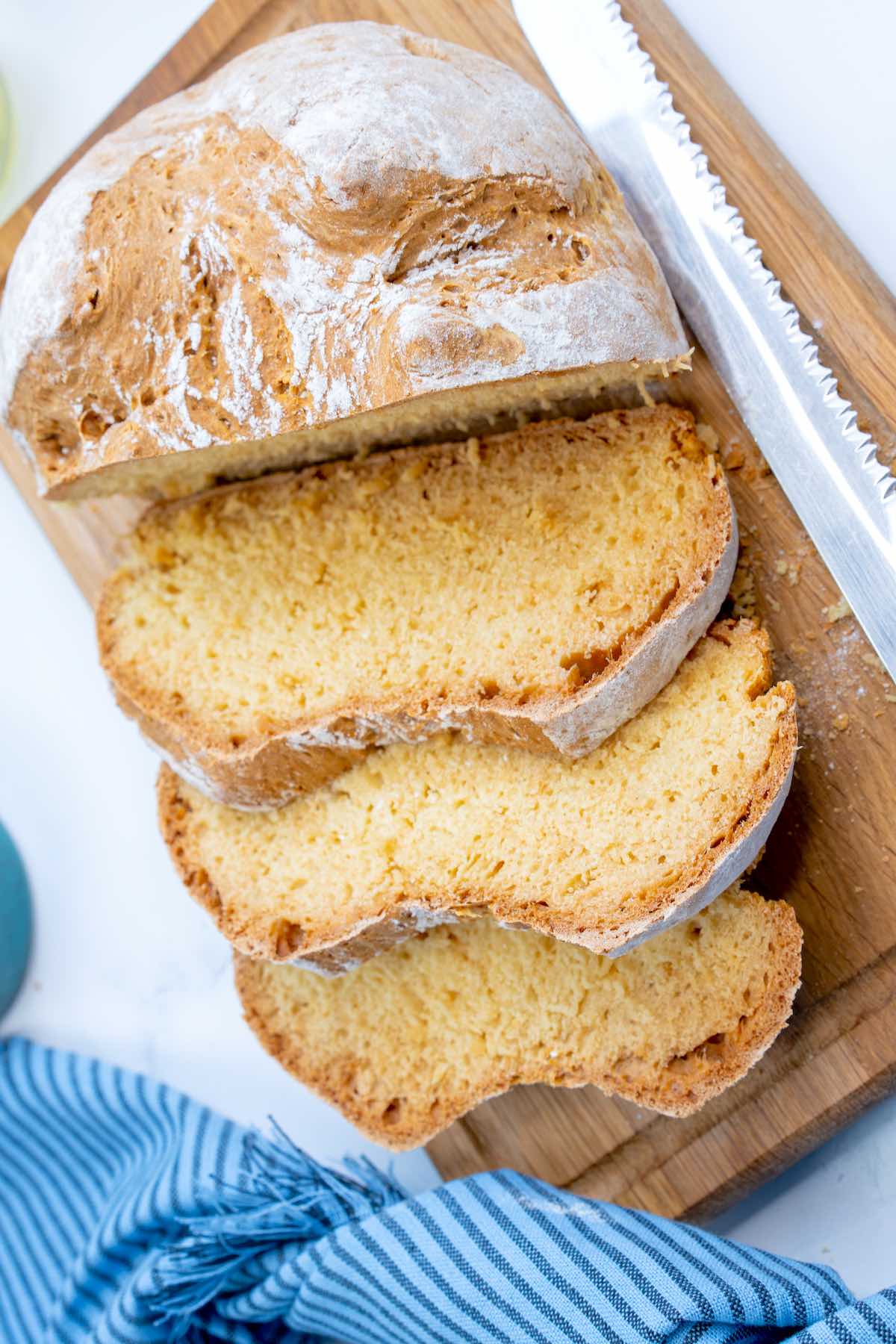
If you’ve ever been intimidated by baking bread from scratch, you need to try my dairy-free bread recipe.
Made entirely without dairy or yeast, this easy bread recipe has the perfect texture, with a great crust on the outside and a fluffy, soft center. Plus, it toasts beautifully, so you can easily incorporate this quick bread into your everyday routine. It makes perfect sandwich bread, toast, or even French toast. Plus, since it’s so easy to make, you can enjoy homemade bread every week.
Table of Contents
Why I love this recipe
- Quick and easy. The step-by-step process is deceptively simple. Just combine the milk and vinegar, let it sit, then mix up the bread batter, shape the loaf, and let it bake.
- Simple ingredients. No oddball ingredients needed here! Just a handful of pantry staples you probably have on hand already.
- Freezer-friendly. This bread freezes exceptionally well, so I like to make a double-batch and store the extra loaf for last-minute bread emergencies.
- Vegan and easy to make gluten-free. This recipe makes naturally vegan bread, and it can easily be made gluten-free by using gluten-free flour.
If you love simple bread recipes, try my protein bread, keto bread, cottage cheese flatbread, and 2 ingredient bread next.
★★★★★ REVIEW
“Love this recipe! Make it a lot. Nice small batch for a single person. I kneaded in Light rye flour for a twist. Came out great.” – Lorrie
Key Ingredients
- Milk. I prefer oat milk or unsweetened almond milk, but you could use any non-dairy milk you prefer. Just make sure they aren’t sweetened or flavored.
- White vinegar. When combined with milk, the vinegar will curdle and give us a great buttermilk substitute. Apple cider and malt vinegar could also work, but the flavor would be pretty overpowering.
- All-purpose flour. I used regular white AP flour, but whole wheat or gluten-free flour blend could also work. If you do go the gluten-free route, I highly recommend Bob’s Red Mill.
- Baking soda. To give rise to the bread without needing yeast.
- Salt. Just a pinch for a little extra flavor.
- Sugar. For a touch of extra flavor, especially when combined with the salt. I’ve also used honey, and it works great.
How to make bread without dairy
This is an overview with step-by-step photos. Full ingredients & instructions are in the recipe card below.
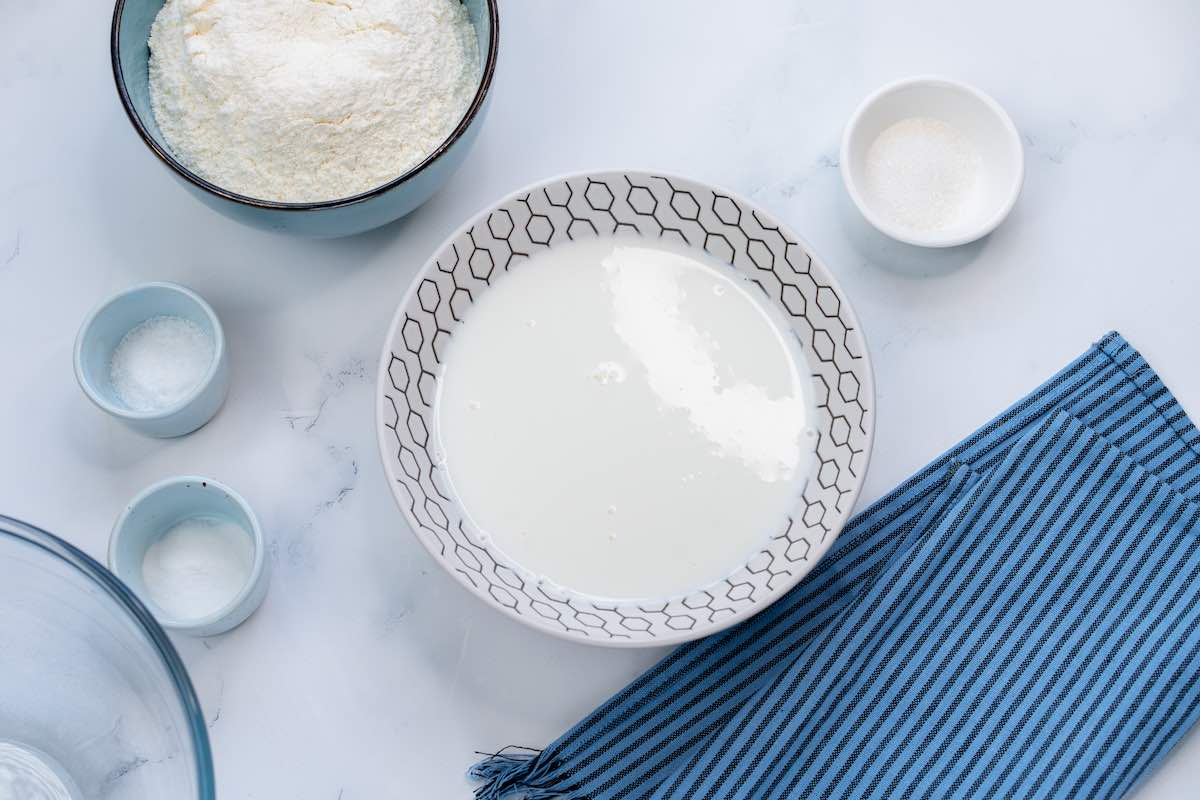
Step 1- Curdle milk. In a small bowl, combine the milk and vinegar and let sit until it curdles.
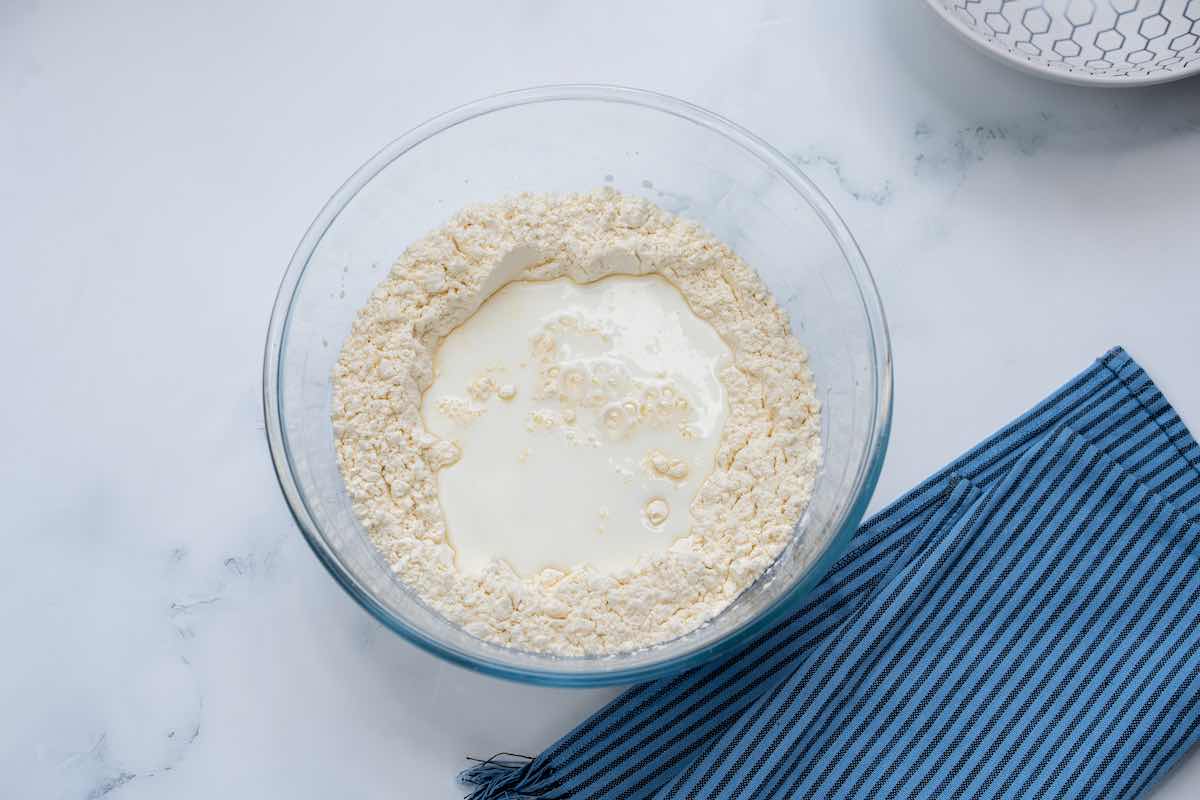
Step 2- Combine the ingredients. Mix flour, salt, sugar, and baking soda. Add curdled milk in two parts, mixing after each until just combined.
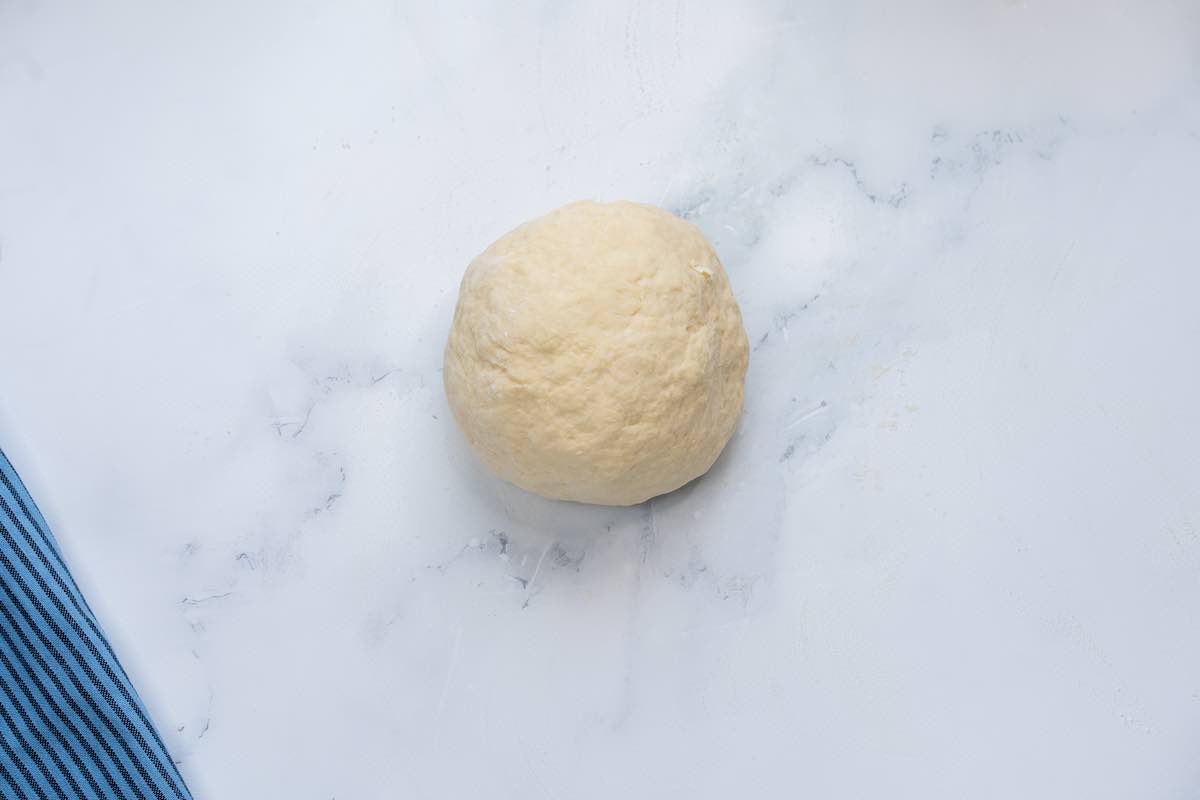
Step 3- Shape. Lightly flour a surface. Sprinkle a tablespoon of flour on the dough, then transfer it to the surface. Gently knead and shape into a dome.
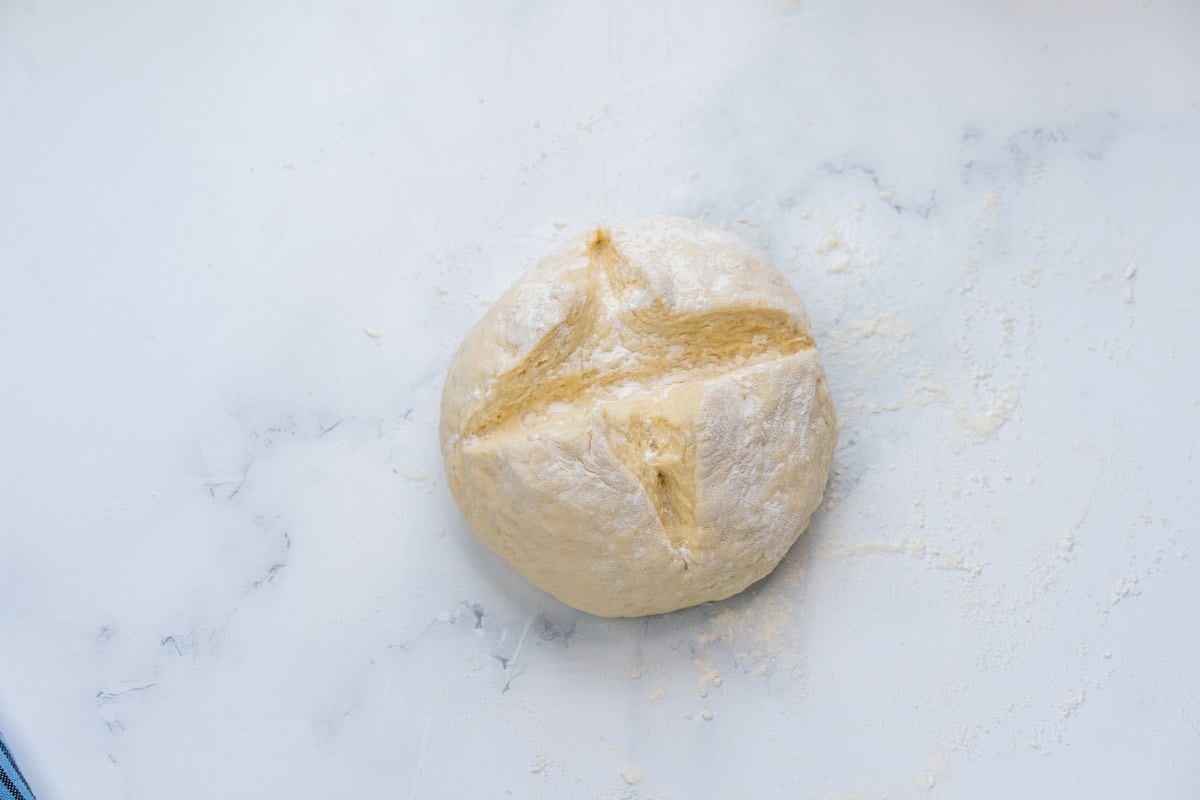
Step 4- Score. Using a sharp knife, slice twice across the dough to form a cross shape around ½ inch thick.
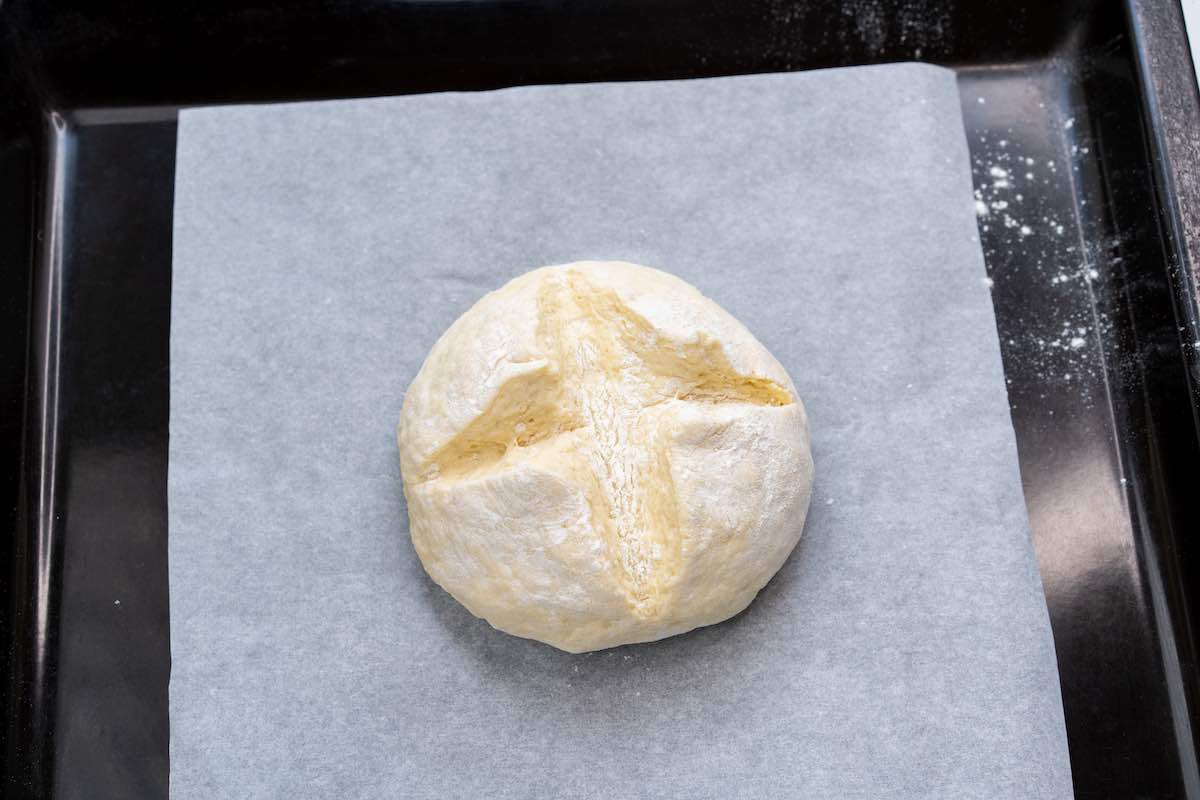
Step 5- Bake for 20–25 minutes, checking at the 20-minute mark. It’s ready when golden brown and sounds hollow when tapped.
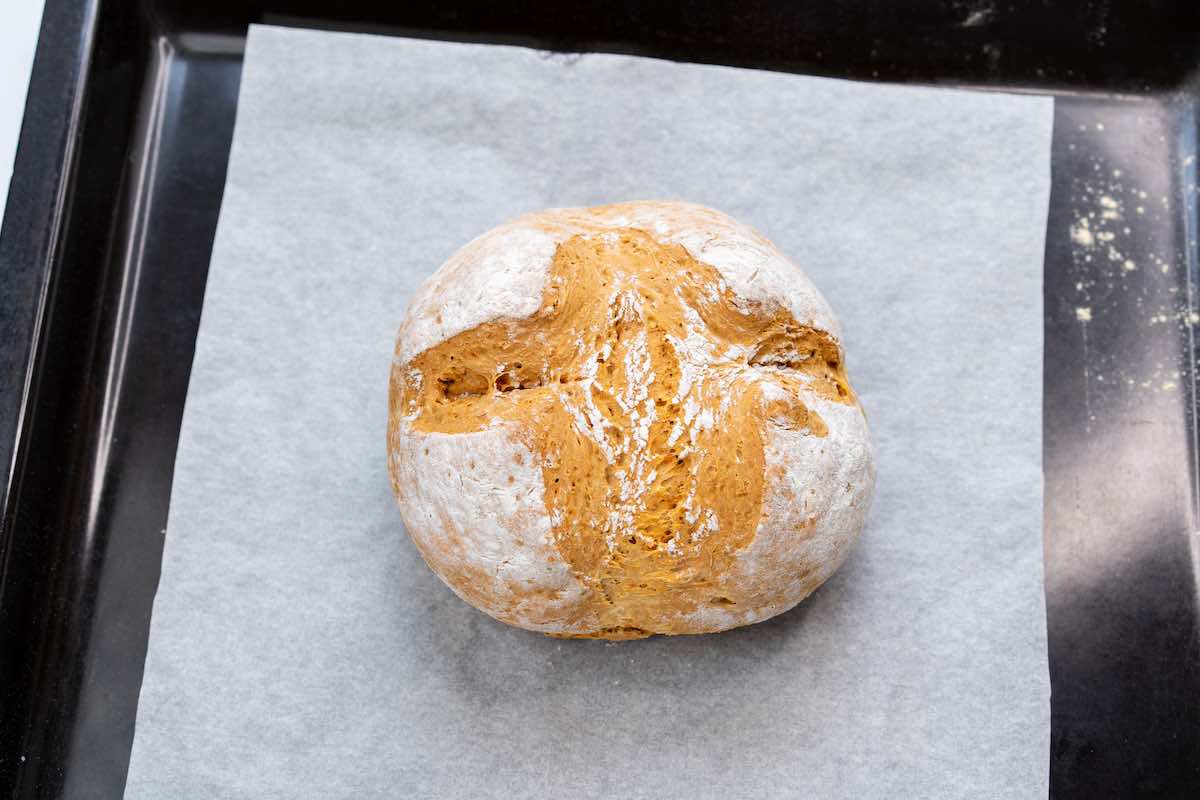
Step 6- Cool, slice, and serve. Remove from the oven and let it cool completely, then slice, toast, and serve.
Arman’s recipe tips
- Avoid overmixing the dough. My #1 tip for making homemade bread is to mix only until the ingredients are just combined. Otherwise, too much gluten will develop, and you’ll be left with a dense, chewy bread.
- Don’t over-knead either. Like mixing, you can accidentally knead out all the air in the bread, so only knead 8-10 times, max.
- Sift the dry ingredients. I’ll admit I don’t always adhere to this advice, but I know that sifting the flour makes for lighter, more airy bread.
- Slice with a serrated knife. I strongly recommend using a serrated bread knife to slice the bread since that will help break through the crust without smashing the bread as you slice.
- Use loaf pans. When I want a more traditional bread loaf shape, I’ll split the dough in half and bake it in two greased loaf pans.
Storage instructions
To store: Leftover bread can be kept in an airtight container at room temperature for up to 2-3 days. If you’d like it to stay fresher longer, store it in the fridge for up to 1 week.
To freeze: Place any leftover bread in a freezer-safe container and freeze for up to 6 months. Let the frozen bread thaw overnight at room temperature before toasting and enjoying.
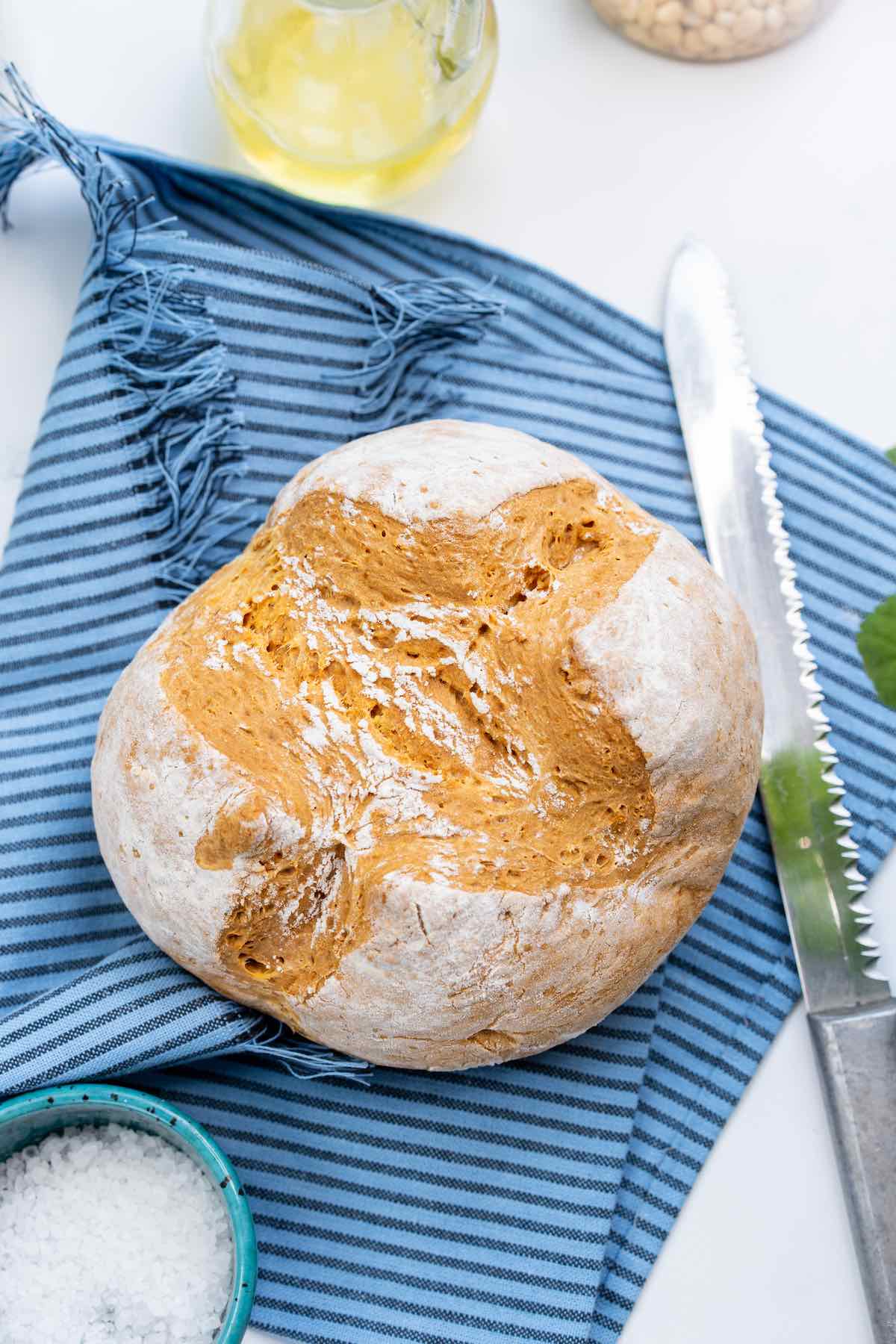
Frequently asked questions
Adding baking powder to the batter, along with all-purpose flour, will help the bread rise similarly to if yeast had been added.
While you can use a bread machine, this recipe works best oven-baked.
Yes, you can. I’ve had success replacing the vinegar with fresh and bottled lemon juice.
More simple baking favorites
If you tried this Dairy Free Bread recipe or any other recipe on The Big Man’s World, please rate the recipe and let me know how it went in the comments below. It really helps others thinking of making the recipe.
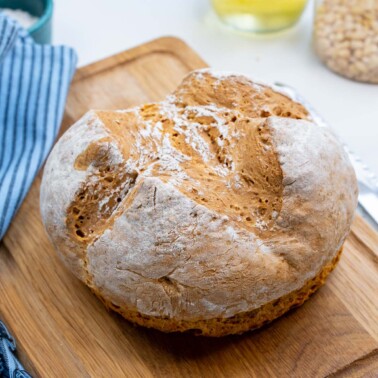
Dairy Free Bread
Video
Ingredients
- 1 cup milk of choice I used oat milk
- 2 tablespoons white vinegar * See notes
- 2 cups all-purpose flour Use gluten-free, if needed
- 1/2 teaspoon baking soda
- 1/2 teaspoon salt
- 1 tablespoon sugar
Instructions
- Preheat the oven to 200C/400F. Line a large baking tray with parchment paper and set aside.
- In a small bowl, add the milk of choice with vinegar and let sit until it curdles, around 10 minutes.
- In a large mixing bowl, add the flour, salt, sugar, and baking soda and mix well. Using a 1/4 cup, add your curdled milk into it in two increments, and mix gently, until just combined.
- Lightly flour a kitchen surface. Sprinkle a tablespoon of flour on top of the dough and transfer to the floured surface. Gently knead the dough, around 8-10 times, and form a dome shape. The dough should still be quite sticky. Using a sharp knife, slice twice across the dough, forming a cross shape, around half an inch thick.
- Transfer the bread dough onto the lined tray. Bake for 20-25 minutes, checking around the 20 minute mark. The bread is cooked when golden brown on the tops and when tapped, makes a hollow sound from the base.
- Remove from the oven and allow to cool on the tray completely, before slicing and toasting.
Notes
- Oatmeal bread. Swap 2 tablespoons of flour with rolled oats, and sprinkle some oats on top before baking the bread.
- Raisin bread. Fold through ¼-½ cup of raisins into the dough. For a sweeter bread, add ¼ cup of sugar.
- Walnut currant bread. Fold through ¼ cup of chopped walnuts and ¼ cup of dried currants (or cranberries).
- Whole grain bread. Use whole wheat flour and add ¼ cup of mixed seeds into the dough, and sprinkle some on top before baking.
- Rosemary bread. Add 1 tablespoon of rosemary and ½ teaspoon of extra salt, and sprinkle coarse sea salt on top before baking.
Nutrition
Originally published April 2020, updated and republished April 2025














This was delicious! Thank you!
So welcome!
Today I tried the rosemary bread version! Turned out great and I’m an amateur baker! Thank you for this recipe. I’m definitely going to bookmark this one to make again!
😀 Thanks, Aimee- Stay safe
Hi there! Made this today…I followed the instructions exactly, but my bread didn’t rise at all and was still doughy inside after 25 minutes. Any idea what the issue could’ve been?
Hi Robin- What flour did you use?
Can you double the ingredients to make a larger loaf? I have a family to feed..
Absolutely! I only made this small batch to avoid spoilage 🙂
You haven’t stated how much ingredients for the bread
Yes I have, it is in the recipe card
Hi, can I use white rice vinegar as well?
I haven’t tried- feel free to experiment and see!
I made a gluten free one, but it’s a door stop. What could be added to make it less of a brick? I’m thinking coconut oil and / or psyllium husk
I’ve only tried this with the gluten-free flour I recommended, not a homemade one.
Can I use bread flour for this recipe instead?
I haven’t tried- feel free to experiment and see!
Can I use bread flour for this recipe?
I haven’t tried- feel free to experiment and see!
Can you use self rising flour? Thanks!
Not for this recipe!
White Vinegar?? is vinegar of this sort not made by fermenting wheat? not gluten free.
Nope, the one I used is made from corn so yes, gluten free.
My milk didn’t curdle???
Did you add the vinegar and let it sit?
Can you make bagels with this recipe?
Try this recipe- https://thebigmansworld.com/2-ingredient-bagels-recipe/
Thank you for clarifying the vinegar amount. I made two loaves today, one GF and the other with Einkorn flour, but followed the recipe as written…. The GF one is very dense and small, wasn’t baked enough so I had to put it back in the oven. Definitely will have to toast this one. It is dry. The other one is still cooling. Never did turn a golden brown on top. I’m hoping for the best even though I possibly overdosed the vinegar.
No worries- this bread doesn’t go a deep brown on top- so just tap the bottom and see if it sounds hollow 🙂
Thanks for the great recipe! I would love to make a bigger loaf. Would I just double the recipe and baking time?
Hi! I’ve made a double size loaf before, and only increased the time by 7-8 minutes 🙂